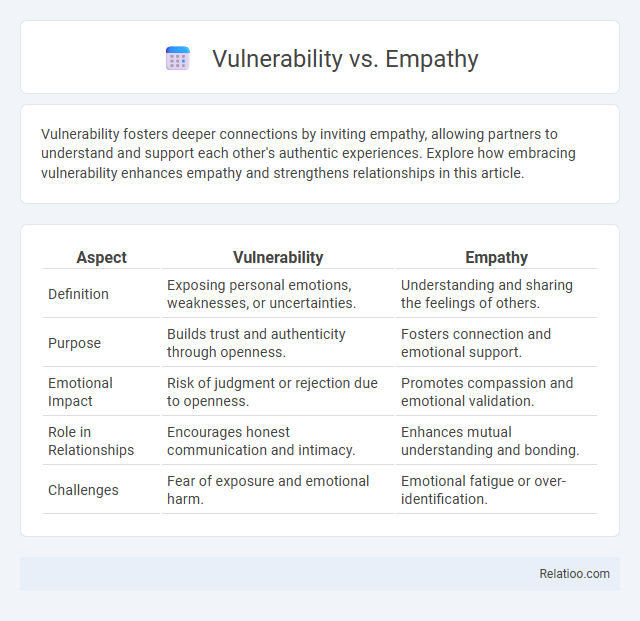Vulnerability fosters deeper connections by inviting empathy, allowing partners to understand and support each other's authentic experiences. Explore how embracing vulnerability enhances empathy and strengthens relationships in this article.
Table of Comparison
| Aspect | Vulnerability | Empathy |
|---|---|---|
| Definition | Exposing personal emotions, weaknesses, or uncertainties. | Understanding and sharing the feelings of others. |
| Purpose | Builds trust and authenticity through openness. | Fosters connection and emotional support. |
| Emotional Impact | Risk of judgment or rejection due to openness. | Promotes compassion and emotional validation. |
| Role in Relationships | Encourages honest communication and intimacy. | Enhances mutual understanding and bonding. |
| Challenges | Fear of exposure and emotional harm. | Emotional fatigue or over-identification. |
Defining Vulnerability and Empathy
Vulnerability is the willingness to expose oneself emotionally, embracing uncertainty and risk in interpersonal connections, which fosters authentic relationships. Empathy involves the cognitive and emotional capacity to understand and share another person's feelings, enabling deeper social bonds and effective communication. Empathic attunement builds on empathy by actively tuning into and responding to others' emotional states in a nuanced, sensitive manner.
The Psychology Behind Vulnerability
Vulnerability in psychology involves the willingness to expose one's authentic emotions despite the risk of judgment or rejection, fostering genuine connections. Empathy refers to the ability to understand and share the feelings of others, while empathic attunement goes deeper, enabling you to resonate with another's emotional state and respond appropriately. Your capacity for vulnerability enhances emotional intimacy and trust, which are crucial components for effective empathic attunement and healthy interpersonal relationships.
The Role of Empathy in Human Connection
Empathy plays a crucial role in human connection by enabling individuals to understand and share the feelings of others, fostering trust and emotional intimacy. Vulnerability allows people to open up authentically, creating a safe space for meaningful interactions that deepen relational bonds. Empathic attunement, the skill of accurately perceiving and responding to another's emotional state, enhances communication and supports supportive, resilient relationships.
Vulnerability vs Empathy: Key Differences
Vulnerability involves openly sharing your true feelings and uncertainties, creating a space for authentic connection, while empathy is the ability to understand and share the emotions of others without necessarily revealing your own. Empathic attunement goes deeper, as it requires tuning into another person's emotional state with nuanced sensitivity and responsiveness. Understanding these distinctions enhances your interpersonal relationships by balancing self-expression with compassionate emotional resonance.
How Vulnerability Fosters Deeper Relationships
Vulnerability fosters deeper relationships by enabling authentic emotional connection, encouraging trust and openness between individuals. Empathic attunement, the ability to perceive and respond sensitively to another's emotional state, amplifies this effect by validating feelings and fostering mutual understanding. Practicing empathy within vulnerable moments strengthens relational bonds, creating a supportive environment for emotional growth and resilience.
Empathy as a Bridge to Understanding
Empathy functions as a crucial bridge to understanding by enabling individuals to deeply connect with others' emotions through empathic attunement, which involves actively tuning into and resonating with another person's feelings. Vulnerability enhances this process by fostering openness and willingness to share authentic experiences, creating a safe space for genuine emotional exchange. By integrating vulnerability with empathic attunement, empathy transcends mere sympathy, facilitating meaningful interpersonal connections and improved emotional comprehension.
The Interplay Between Vulnerability and Empathy
Vulnerability fosters deeper connections by creating a safe space for authentic emotional exchange, which enhances empathy through genuine understanding of another's experience. Empathic attunement strengthens this dynamic by enabling individuals to sensitively perceive and respond to subtle emotional cues, cultivating trust and emotional resonance. The interplay between vulnerability and empathy is essential in building meaningful relationships, where openness invites empathy, and empathic attunement reciprocally encourages continued vulnerability.
Common Misconceptions About Vulnerability and Empathy
Vulnerability is often mistaken for weakness, but it actually involves courage and openness to emotional exposure, which fosters genuine connections. Empathy is frequently misunderstood as simply feeling sorry for someone, whereas it requires deeply understanding and sharing another person's emotional experience without judgment. Empathic attunement goes beyond empathy by actively tuning into subtle emotional cues and responding thoughtfully, a skill that is essential for effective interpersonal relationships and emotional intelligence.
Practical Ways to Cultivate Vulnerability and Empathy
Cultivating vulnerability begins with embracing discomfort and expressing authentic emotions in safe environments, fostering deeper connections and trust. Empathy develops through active listening, perspective-taking, and validating others' experiences without judgment, enhancing emotional understanding and compassion. Empathic attunement can be practiced by mindfully tuning into nonverbal cues, maintaining presence, and responding sensitively to others' emotional states, which strengthens relational bonds and emotional resonance.
The Impact of Vulnerability and Empathy on Personal Growth
Vulnerability allows you to confront your true emotions, fostering self-awareness and authentic connections that drive personal growth. Empathy deepens your understanding of others' experiences, promoting emotional intelligence and stronger relationships. Empathic attunement enhances this process by fine-tuning your sensitivity to others' feelings, enabling meaningful interactions that support ongoing development.

Infographic: Vulnerability vs Empathy
 relatioo.com
relatioo.com